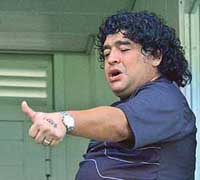Maradona taken by ambulance to clinic for excessive eating, drinking and cigars
Soccer hero Diego Maradona was taken by ambulance to a Buenos Aires clinic because of health problems caused by excessive eating, drinking and cigars, but his life is not in danger, his doctor said Thursday.

Maradona, 47, who has battled weight and drug problems, arrived at the Guemes health clinic in the Argentine capital in an ambulance late Wednesday and the clinic released a statement saying only that the soccer great had suffered an unspecified "imbalance."
His two daughters, Dalma and Giannina, arrived a few minutes later and speculation began about how serious Maradona's health problems were. The story topped Argentina's newscasts and fans began arriving for a vigil outside the clinic.
But Maradona's doctor, Alfredo Cahe, said early Thursday that Maradona "wasn't in any danger" and had been taken to the private clinic "against his will, he didn't want to go."
"It wasn't an imbalance in his blood circulation or with his heart, but was a product of an incoherent regimen of excessive eating, drinking and smoking," Cahe told reporters in the doorway of the Guemes clinic.
He said the ex-soccer star would stay at the clinic a few days while tests are carried out.
Maradona is revered as a sports hero in Argentina.
He led Argentina to the 1986 World Cup championship and went on to become one of soccer's greatest players. In 2001, he was named by FIFA as one of the greatest players in soccer history, alongside Brazil's Pele.
But off the field he battled cocaine addiction and obesity. In 2005, Maradona underwent a gastric bypass surgery in Colombia and soon after sported a thinner look.
Over the weekend, Argentine newspapers reported that Maradona had put on weight and was considering taking a "vacation" in Switzerland to help shed the extra pounds (kilos).
Cahe told the sports daily Ole in its edition last Sunday that he was worried about the former soccer star's weight.
Maradona was hospitalized in Uruguay in 2000 and again in 2004 in Buenos Aires amid concerns about his health. Soon after his release from the hospital in 2004, Maradona was counseled for drug abuse in Argentina and in September of that year traveled to Cuba for treatment at Havana's Center for Mental Health.
Among his feats, Maradona led Argentina to the 1990 World Cup final and won Italian and Argentine league titles. But in 1991, Maradona failed a drug test and was banned for 15 months, and failed another drug test at the 1994 World Cup finals in the United States.
He retired in 1997.
In 2005, a healthier Maradona started a career as host of his own immensely popular television program called "La Noche del 10" or "The Night of 10" - a reference to his famed No. 10 jersey.
The program became a hit during its season-long run as he sparred playfully on one show with boxer Mike Tyson and aired an interview with communist President Fidel Castro, whom he befriended while in Cuba.
On one show, Maradona even acknowledged that he intentionally struck the ball with his hand in the famous "Hand of God" goal against England in the 1986 World Cup quarterfinals - calling that trick just "a bit of mischief."
The referee allowed the goal to stand and despite protests by the English team that Maradona appeared to punch the ball into the net.
That 1986 quarterfinal match against England also included what soccer's governing body declared the greatest goal in World Cup competition - one in which Maradona dribbled half the length of the field, dodging nine opponents to score the winning goal.
Subscribe to Pravda.Ru Telegram channel, Facebook, RSS!




